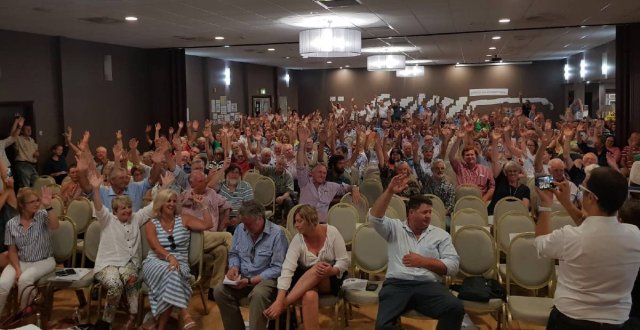
More than 500 people gathered at the Coonamble Bowls Club on February 10 to declare they do not want a gas pipeline across NSW’s western slopes and would fight to protect the Great Artesian Basin.
The meeting expressed deep-seated concern about the potential threat of coal seam gas (CSG) mining to the Great Artesian Basin.
APA has been contracted to build a gas pipeline through the NSW slopes and plains for gas giant Santos, which wants to sink 850 CSG wells in a 95,000-hectare project area in the Pilliga State Forest.
Santos, a private company, formed in South Australia in 1954 to drill for oil.
Local farmer Adam Macrae summed up people’s concerns: if a pipeline was to be built on the western slopes, gas wells would follow and he was against both.
“The Great Artesian Basin is below us, and underneath that are coal seams,” he said. “The company wants to drill through the basin to the coal seams and then exploit gas reserves around them and bring it back to the surface. Pipes will be punched through the basin’s waters, chemicals and huge amounts of water will be forced through those pipes, bringing the gas to the surface for capture.”
The precarious nature of water in Australia and the fear that this forced gas extraction (or fracking) could put at risk the aquifers of the Great Artesian Basin had the assembled crowd concerned. Farmers in the area say that if the basin’s integrity is compromised it would affect their ability to farm in an area responsible for much of NSW’s food production.
The Great Artesian Basin is the largest and deepest artesian basin on the planet, underlying 1.7 million square kilometres of the continent and thought to contain 64,000 cubic kilometres of ground water.
It is a vast reserve and the water is held in positive pressure, meaning it only requires one puncture of the reserve to tap into a reliable flow without a pump. In many places in inland Australia this is the only fresh water available. Without the Great Artesian Basin, much of inland Australia would not be habitable.
Macrae cited Cape Town’s drought and the fact that water might soon no longer flow from the city’s taps.
“With a 17-inch (431 millimetre) rainfall, Coonamble can’t stand up on surface water alone. Look at Cape Town now. The mayor’s got a plan there — rain.
“If you want to talk significant, let’s talk about agriculture, we can do this forever,” he said, referring to farming’s longevity as opposed to the finite nature of the resource extraction industry.
The meeting also heard from Joe Hill, who told the crowd how he had stood firm against APA, forcing the pipeline to be re-routed around his Queensland property, creating what is known among his supporters as “Joe’s bend”.
Former investment banker Peter Martin told the meeting the chances of the entire Narrabri Gas Project and associated infrastructure, including the Pilliga pipeline getting off the ground, were slim. He questioned the company’s business model and said even if it could make the numbers stack up, mining fossil fuels was a sunset industry.
Labor MLC Daniel Mookhey said he would be reporting back to Opposition Leader Luke Foley about the meeting. “We have heard the anxiety across the state,” he said. “When you have seventh-generation farmers telling you coal seam gas is the biggest threat to their farms since 1810, you listen.”
Gamilaroi woman Teresa Trindall, who is a nurse, said apparent health problems related to unconventional gas mining had been detailed by the Darling Downs Public Health Unit in 2013 and included serious conditions. She said farmers and Traditional Owners had to stick together to defend the country and its water.
The meeting voted unanimously that coal seam gas mining should not be allowed in NSW.
[A number of groups have come together to organise a massive Time2Choose rally on Saturday March 24. For more information visit Lock the Gate Alliance.]
Like the article? Subscribe to Green Left now! You can also like us on Facebook and follow us on Twitter.